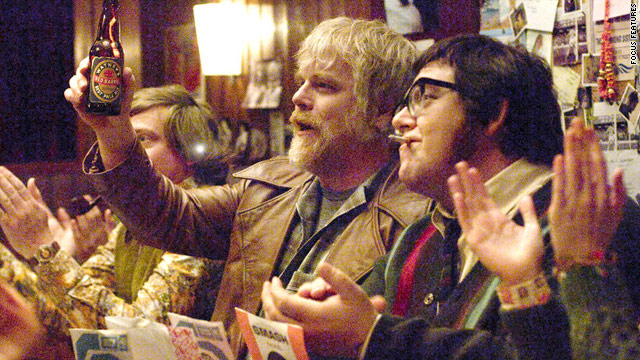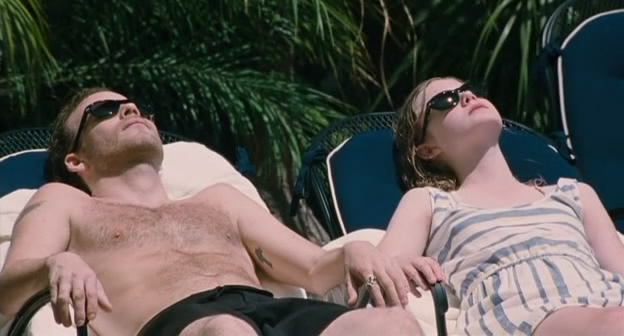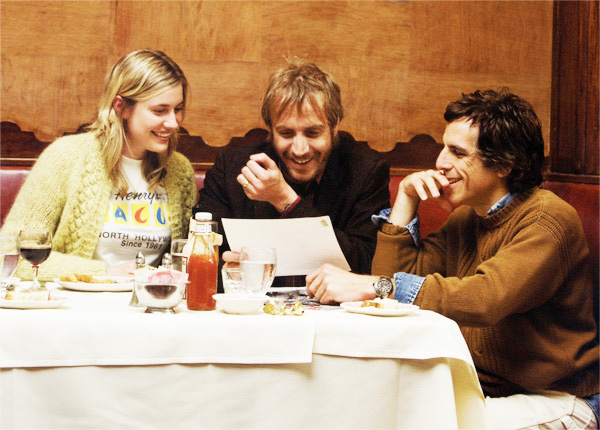6. Pirate Radio aka The Boat that Rocked (2009)
Fans of Team Zissou are most likely to appreciate this dry comedy set on the high seas. Inspired by true events, this film follows a crew of disc jockeys illegally broadcasting rock music as the British government attempts to prohibit it in 1960s.
When seventeen-year-old Carl can’t seem to clean up his act, his mother makes the curious decision to board him on a ship full of rock ‘n’ roll DJs. As he gets to know his shipmates (including a smooth-talking American radio star played by Philip Seymour Hoffman), acquaints himself with their vast musical knowledge, and ultimately seeks their (foolish) council in losing his virginity, Carl begins to suspect that one of the crew members is actually his long lost father.
In addition to the setting and reluctant camaraderie of the characters, another similarity to Anderson can be seen in the fact that even the antagonists in Pirate Radio the are more endearing than most. The pompous bureaucrat trying to shut down the radio ships is a pitiful joke of a man, and his assistant, Mr. Twatt (pronounced as it’s spelled), is clearly smarter and more sympathetic than his so-called superior. A similar vibe can be detected in Steve Zissou’s nemesis, Alistair Hennessy (the great Jeff Goldblum). He is prick, as is Steve, but not evil or beyond redemption. Such villains end up providing more comic relief than contemptibility.
Much like in The Life Aquatic, the audience develops a strong feeling of attachment to the large cast of characters, and leaves wanting to know more about them.
7. Somewhere (2010)
Sofia Coppola co-produced this subtle film with her brother, long-time Wes Anderson collaborator, Roman Coppola. Somewhere stands out from the former Coppola’s other work by creating a somber mood in a beautiful environment. Like many key scenes in The Life Aquatic with Steve Zissou, Somewhere takes the picturesque atmosphere of decedent Los Angeles hotels and turns it glum with the characters it introduces. A finely tailored original score by French alt-rock group Phoenix compliments the downbeat mood.
Based partially on Sofia Coppola’s own childhood as the daughter of legendary director Francis Ford Coppola, Somewhere examines the strained relationship between an aging actor (Stephen Dorff) and his eleven-year-old daughter (Elle Fanning). Much like in the case of Steve Zissou, Dorff’s character, Johnny, is going through an existential crisis, feeling empty and filling up his life with drugs and meaningless sex, until his estranged daughter shows up. While the tone of the film is considerably more sober than The Life Aquatic, it ends on a more optimistic note than the relationship between Steve and Ned Zissou.
8. Greenberg (2010)
Another long-time Wes collaborator, Noah Baumbach, applied his experience to this one.
Ben Stiller plays Roger Greenberg, a socially awkward musician who comes to LA to housesit for his wealthy brother. There he meets his brother’s equally awkward assistant, Florence (Greta Gerwig), who gives him a much-needed boost of confidence and exhilaration.
A little subtler than Baumbach’s other films like The Squid and the Whale or Frances Ha, Greenberg’s strength lies in its reliability, though differs somewhat from Anderson in its mood. The character-driven narrative feels at times like the two leads are little more than a pin drop away from an emotional meltdown. While many Anderson characters are similarly faced with mid-life (The Life Aquatic), quarter life (Bottle Rocket), coming-of-age (Rushmore, Moonrise Kingdom), or all of the above (The Royal Tenenbaums) crises, their stoic humor and wit usually outshine their cynicism. Wes Anderson has the uncanny ability to make seemingly unlikeable characters lovable.
Baumbach, who co-wrote The Life Aquatic and Fantastic Mr. Fox with Anderson, delivers a very familiar touch with Greenberg, with only slightly less developed characters.
9. Submarine (2010)
This novel-turned-movie, at first glance, looks like Rushmore in the UK with a more confident kid. Fifteen-year-old Welsh schoolboy Oliver Tate is every bit as clever as Max Fischer (maybe even more so, since he decides to pursue girls his own age rather than adult women) and a bit more focused on helping other people, namely his quarreling parents, before himself.
Though at first, the film may seem most thematically and stylistically similar to Rushmore, it ends up feeling different. Submarine, like many films with young protagonists, makes the adolescent boy seem more mature than most of his adult counterparts, whereas the genius of Rushmore lies in the way it takes an emotionally immature kid, pairs him up with an emotionally immature adult, and forces them both to grow up.
Submarine ultimately feels more like The Fantastic Mr. Fox, in that its main characters, however flawed, always seem pretty sure of themselves and their goals.
10. Frances Ha (2012)
Noah Baumbach’s similarities to Anderson are probably most clear in his 2013 collaboration with Greta Gerwig. The offbeat, introspective dramedy follows Frances Halladay (Gerwig) as she travels from New York to California to Paris and back, enjoying reunions with people she left behind while doubting her own prospects as a professional dancer.
The film explores common themes in Wes Anderson and Sofia Coppola’s works, such as loneliness and uncertainty contrasted with beauty and wealth. While not so much preaching the cliché that money can’t buy happiness, these films tend to focus on what does make people feel happy and fulfilled, namely relationships with others. Gerwig, who gives a more spirited performance as the title character compared to her supporting role in Greenberg, brings an uncommon combination of wit and adorability to the table in Frances Ha.
Stylistically, this film’s biggest difference from an Anderson piece is its choice to go black-and-white, reminiscent of Woody Allen’s Manhattan. Nonetheless, Anderson fans will see similarities in the cinematography throughout.
Author Bio: Chris Dobrogosz is a freelance writer currently based in the greater New York City area. He studied broadcast media at George Mason University, and has an affinity for Sci-Fi and dark comedy.




